- Home
- Michael Chabon
Summerland Page 3
Summerland Read online
Page 3
That was when Ethan did something that surprised him. He got up from the bench, muttered something to no one in particular about needing to pee really bad. He didn't stop to think, and he didn't look back. He just took off into the woods after the bushbaby.
Jock MacDougal Field occupied only the lower portion of the Tooth—the part where it met the boar's jaw. The rest of the long, jagged spit was all forest, five hundred acres of tall white trees. These were paper birches, according to Mr. Feld. He had told Ethan that they were also called "canoe birches" because the Indians had once used the inner bark for boat building as they had used the outer bark, like a peeling pale wrapper, for writing and painting on. On a rainy day in winter, when the birches stood huddled, bare and ghostly, the birch forest at the very end of Clam Island could look extremely eerie and cold. Even on a bright summery afternoon, like today, when they were thick with green leaves, there was something mysterious about the tall, pale, whispering trees. They surrounded the ball field, and the parking lot, and the grassy slope with the flagpole where the wedding receptions were held. They stood, pressed together like spectators, just on the other side of the green outfield fence. Any ball hit into the birch wood was a home run, and lost forever.
Ethan ran across the parking lot and up over the log where he had caught a flash of bushy red tail. He found a clear trail leading away from there to the north side of the Tooth. At first he ran along the trail, hoping to catch sight of the bushbaby as it skittered through the woods. But, after a while, the dim heavy light filtering through the green leaves of the birch trees seemed to weigh him down, or tie him up in shadows. He slowed to a trot, and then just walked along the path, listening for something he kept thinking that he heard, a sound that was rhythmic and soft. He told himself that it was just the sound of his own breathing. Then he realized that it must be the waves, slapping against the beach at Summerland. That was where this particular trail headed: to Hotel Beach. Hotel Beach was popular with teenagers, mostly, but Ethan and his father had been there once. During the Clam Boom there had been some kind of resort, called the Summerland. You could still see the ruins of some cabins, a collapsed dance hall, the bones of an old pier.
Just now it seemed like an inviting kind of place to go and feel ashamed. He would sit there for a couple of hours, hating himself, and then by the time the police found him, his father would be so worried that he would have forgotten and forgiven Ethan's cowardice, and his failure as a ballplayer. He would see how upset and afraid Little League was making Ethan. "What was I thinking?" he would say. "Of course you can quit the team, son. I only want what's best for you."
By the time Ethan reached Hotel Beach, he was feeling almost happy in his sadness, and had forgotten all about the bushbaby. He came out of the woods onto the sand and stood for a moment. Then he walked out onto the beach. The sand was dense and crunchy under his shoes. He sat down on the great gnarled log of driftwood where he and his father had sat to eat their lunch the day they visited. It was a real grandfather log, the wreck of some enormous old tree, spiked with snapped branches. He had just noticed the strange, cold sting of the wind, and the gray clouds that were blowing in from the Olympic range, when he heard voices nearby. He ducked back into the trees, listening. They were the voices of men, and there was a raucous note in them that struck Ethan as harsh and somehow hostile. Carefully, keeping low, he inched his way toward the ruined cabins.
A big Range Rover was parked in the clearing beside the dance hall. The words TRANSFORM PROPERTIES were written on the side of the car. Four men in suits stood around the front of the car, looking over some plans that they had unrolled across the hood. Although the day was perfectly dry, all four men were wearing bright yellow raincoats over their suits, and big rubberized leather rain boots, the kind that had steel toes. He did not know why—it was just four guys with neckties in raincoats—but he felt as if they had come here to do something very bad.
The men seemed to be disagreeing about something. One pointed at the ground, threw up his hands, and walked around to the back of the car. He opened the hatch and took out a heavy shovel. With a stern look at the three other men, he walked several paces up away from the beach, toward the dance hall that for the last forty years had been sinking back into the woods. The man pointed again at the ground, as if to suggest that whatever he found here was going to prove whatever point he had been trying to make. Then he raised his shovel, and the blade bit into the carpet of weeds and yellow flowers at his feet.
Someone at Ethan's elbow sighed. It was a bitter, long, weary sigh, the way someone sighs when the thing she has most dreaded finally comes to pass. It was right in his ear, unmistakable and clear. Ethan turned to see who had sighed, but there was nobody there. The hair on his arms and the back of his neck stood on end. The breeze was cold, and as sharp as the tooth of a shovel. Ethan shivered. Then the man with the shovel cried out. He reached up and slapped the back of his neck. Something—it looked like a little stone—went skipping off into the grass behind him. Ethan looked up and saw, in the branches of a nearby birch, the little red animal with the mocking eyes. It was much more like a fox, he saw, than a bushbaby. But it was not a fox, either. It had hands, for one thing, sharp-looking little raccoon hands, one of which was holding on to a forked slingshot. And apart from its pointed snout it had a human face, whiskered and long-eared and just now wrinkled in amused satisfaction. It saw Ethan, and seemed to raise the slingshot in a kind of salute. Then, solemn-faced again, it scurried straight down the tree and took off into the woods.
Ethan must have made some kind of a noise of surprise, because all four of the men looked up at him. He froze, and his heart kicked and thudded so hard he could hear it in his teeth. Their eyes were concealed by narrow sunglasses, and their mouths were thin and nearly lipless. They were going to come after him. He turned to run back into the woods, and immediately crashed into the old man with the Indian ponytail. For a little old guy he felt amazingly solid. Ethan fell backward and landed on his behind. The old man just stood there, nodding his head.
"Told you," he said.
"Do I—is it my turn? Did they put me in the game?"
"They sure would like to," the old man said. "If you willin'."
Ethan just wanted to get away from the TransForm Properties men.
"I don't blame you for that," said the old man, and it is a measure of just how spooked Ethan was that it did not occur to him until much later that the old man had read his thoughts. "Come on, best get out of here."
"Who are they?" Ethan asked, following along behind the old man, who was dressed in a suit, too, but a baggy woolen one cut from a weird orange plaid that would not have looked out of place upholstering one of the old couches on the Rideouts' front porch.
"They the worst men in the world," the old man said. "My name is Chiron Brown, by the way. When I pitched for the Homestead Grays, they called me 'Ringfinger.'"
"Do you have a big ring finger?" Ethan reasoned.
"No," the old man said, raising his leathery right hand. "I doesn't have no ring finger at all. You would not believe what kind of crazy motion I could put on a baseball without no ring finger."
"Did they send you to come get me?" Ethan said, as they approached the parking lot. He could already hear the shouting of parents, the shrill mocking voices of boys, the raspy pleading of Coach Olafssen.
"As a matter of fact, they did," said Ringfinger Brown. "A long time ago."
IT WAS THE STRANGEST MOMENT IN WHAT HAD SO FAR BEEN A fairly strange morning. When Ethan got back to the bench, nobody turned around, or even seemed to notice that he had ever left. But the very instant his butt touched the smooth pine surface of the bench, Mr. Olafssen looked over at him, and gave him a big fatal wink.
"All right, Ethan. Big Ethan. Let's get you in the game."
Things, it turned out, were no longer quite so rosy for the Roosters as when Ethan had left. The Angels had managed to come back with six more runs, and now the score was 11–8. B
ut it was the top of the seventh and final inning, and Mr. Olafssen was pretty much obliged, by the laws of decency, fair play, and the Clam Island Mustang League, to play every able-bodied kid on the team for at least half an inning of every game. There were two out, two on, and no runs in, and it was going to be up to Ethan to pad the Roosters' lead.
"Get in there, now," Mr. Olafssen said, just the way he always did. "Get in there and take your hacks."
Ethan, however, did not want any hacks. Usually, when he came to the plate, Ethan Feld tried to swing his bat as little as possible. He just kept the bat on his shoulder, hoping for a walk. The truth is, he was afraid of trying to accomplish anything more, at the plate, than a walk. And he was afraid of being hit by the ball. But mostly he was mortally afraid of striking out swinging. Was there any worse kind of failure than that? Striking out. It was the way you described it when you failed at anything else in life, the symbol of every other kind of thing a person could possibly get wrong. Often enough, the opposing pitching was not too good in the Mustang League. Ethan's strategy of just standing there, waiting for four bad pitches to come across the plate before three good ones did, frequently worked. But it was a strategy that was not at all respected by the other players. Ethan's nickname in the Mustang League, in fact, was "Dog Boy," because of the way he was always hoping for a walk.
He trudged up to the plate, dragging his bat behind him like a caveman in the cartoons dragging his club. He hoisted the bat to his shoulder—it was still sore from when his father had stopped short to avoid hitting the little fox-monkey thing—and looked over at his father, who gave him a big thumbs-up. Then Ethan stared out at Per Davis, who had taken over the pitching for the Angels. Per looked almost sorry to see Ethan. He winced a little bit, then sighed, and went into his stretch. A moment later something troubled the air around Ethan's hands.
"Her-ite one!" cried out the umpire, Mr. Arch Brody of Brody's Drug. Mr. Brody prided himself on the authentic-sounding way he called the balls and strikes.
"Come on, Dog Boy," called Kyle. "Get that bat off your shoulder."
"Come on, Dog!" called the other boys.
Ethan let another blur color the air between him and Per Davis.
"Her-ite TWO!" Mr. Arch Brody yelled.
Ethan heard the gravelly voice of Ringfinger Brown.
"When the time come," the old man said, "you best be ready to swing."
Ethan searched the crowd but could not find the old man anywhere, though the voice had sounded as if it were just at his elbow. But he saw that Jennifer T. was looking right at him.
"Breathe," she suggested, moving her lips without speaking. Ethan realized that he had been holding his breath from the moment Mr. Olafssen had looked his way.
He stepped out, took a breath, then stepped back in, resolved at last to take a hack. Playing the odds was one thing when the count was even at 0; with two strikes on him, maybe it made more sense to swing. When Per Davis reared back to let fly, Ethan wiggled his fingers on the shaft of the bat, and worked his shoulders up and down. Then, unfortunately, just before he swung the bat he did something kind of questionable. He closed his eyes.
"Her-ite her-REE!" shouted Mr. Brody, sealing Ethan's doom.
"That's all right," Jennifer T. told him as they walked out to the field. "We'll hold 'em. At least you took a hack."
"Yeah."
"It was a nice-looking swing."
"Yeah."
"Just a little early, is all."
"I shut my eyes," Ethan said.
Jennifer T. stopped at first base, which was hers. She shook her head, not bothering to conceal her exasperation with Ethan, and then turned toward home plate.
"Well, try to keep them open in the field, huh?"
In the field—Coach Olafssen always stuck Ethan out in right, a region of the diamond to which boys who prefer to remain invisible have been sent since baseball was invented—the situation was, if anything, even worse. Forget about catching the ball; Ethan never seemed to see it when it was headed toward him. Even after a fly ball landed in the grass, and went skipping happily along toward the outfield fence for a triple at least, Ethan often took quite a while to find it. And then, when, finding it at last, he threw the ball in! Oy! An entire row of fathers, watching from behind the backstop, would smack their foreheads in despair. Ethan never remembered to throw to the cut-off man, who stood waiting, halfway between Ethan and home, to relay the throw to the catcher. No, he just let loose, eyes screwed tight shut: a big, wild windmill of a throw that ended up nowhere near home plate, but in the parking lot behind third base, or, once, on the hindquarters of a sleeping Labrador retriever.
Ethan wandered into right, hoping with all his heart that nothing would happen while he stood there. His hand felt sweaty and numb inside his big, stiff new fielder's mitt. The chill wind he had felt at Hotel Beach was blowing across the ball field now, and clouds were covering the sun. The gray light made Ethan squint. It gave him a headache. An echo of the old man's voice lingered in his mind in a way that he found quite irritating. He puzzled for a while over the question of whether there was really any difference, as far as your brain was concerned, between hearing something and remembering how something sounded. Then he worked for a while on possible theories to account for the presence on Clam Island of a rare African primate. His thoughts, in other words, were far removed from baseball. He was dimly aware of the other players chattering, pounding their gloves, teasing or encouraging each other, but he felt very far away from it all. He felt like the one balloon at a birthday party that comes loose from a lawn chair and floats off into the sky.
A baseball landed nearby, and rolled away toward the fence at the edge of the field, as if it had someplace important to get to.
Later it turned out that Ethan was supposed to have caught that ball. Four runs scored, making the final total Angels 12, Roosters 11. In other words, eight losses in a row. The Angel who hit the ball that Ethan was supposed to have caught, Tommy Bluefield, was angry at Ethan, because even though his hit had brought in all three baserunners and himself, it did not count as a grand slam home run, since Ethan had committed an error. He ought to have caught the ball.
"You stink," Tommy Bluefield told him.
The magnitude of Ethan's failure, the shame that he had brought down on himself, ought to have been the focus of everyone's thoughts, just then, as Ethan dragged his sorry self off the field to the bleachers, where his father was waiting with the crumpled flower of his smile. His teammates ought to have lined up on either side of him and beaten him with their mitts as he was made to run a gauntlet. They ought to have ripped the patch from his uniform shoulder, broken his bat, and uninvited him to come have post-game pizza in Clam Center with everybody else. Instead they seemed quickly to lose interest in the shameful saga of Ethan Feld, and to turn their wondering faces to the sky. On Jock MacDougal Field, at the Tooth, where every summer for as long as white men could remember there had been an endless supply of blue sky and sunshine, it had started to rain.
* "The Darndest Way of Getting from Here to There"—slogan, Feld Airship, Inc.
CHAPTER 2
A Hot Prospect
THE NEXT MORNING ETHAN awoke from dreams of freakish versions of baseball where there were seven bases, two pitchers, and outfields beyond outfields reaching into infinity, to find the little red fox-monkey sitting on his chest. Its thick fur was neatly combed and braided, and the braids on its head were tied with bright blue ribbons. And it was smoking a pipe. Ethan opened his mouth to scream but no sound emerged. The creature weighed heavily on his chest, like a sack of nails. Whoever had bathed it and tied its hair in bows had also doused it in rosewater, but underneath the perfume it stank like a fox, a rank smell of meat and mud. Its snout quivered with intelligence and its gleaming black eyes peered curiously at Ethan. It looked a little dubious about what it saw. Ethan opened and closed his mouth, gasping like a fish on a dock, trying to cry out for his father.
"Calm, piglet,
" said the fox-monkey. "Breathe." Its voice was small and raspy. It sounded like an old recording, coming through a gramophone bell. "Yes, yes," it went on, soothingly. "Just take a breath and never be afraid of old Mr. C., for he isn't going to hurt not the tiniest hair of your poor hairless piglet self."
"What—?" Ethan managed. "What—?"
"My name is Cutbelly. I am a werefox. I am seven hundred and sixty-five years old. I have been sent to offer you everlasting fame and a fantastic destiny." He scratched with a black fingernail at an itch in the dazzling white fur of his chest. "Go ahead," he said. He pointed at Ethan with the stem of his pipe. "Take a few deep breaths."
"Sitting…" Ethan tried. "On…my…chest."
"Oh! Ha-ha!" The werefox tumbled backward off of Ethan, exposing him to the startling sight of its private parts and furry behind. For Cutbelly was quite naked. This had not struck Ethan as odd when he was under the impression that he (Cutbelly was definitely a he) was an animal, but now Ethan sort of wished that Cutbelly would at least wear some pants. After completing his back flip, Cutbelly landed on his long bony back paws. The feet were much foxier than the quick black hands. "My apologies."
Ethan sat up and tried to catch his breath. He looked at the clock on his nightstand: 7:23. His father might walk in at any moment and find him talking to this smelly red-brown thing. His eyes strayed to the door of his bedroom, and Cutbelly noticed.
"Not to worry about your pa," he said. "The Neighbors worked me a sleeping grammer. Your pa would not hear the crack of Ragged Rock."
"Ragged Rock? Where is that?"
"It isn't a place," Cutbelly said, relighting his pipe. It had been worked from a piece of bone. Ethan thought: Human bone. On the bowl was carved the bearded likeness of Abraham Lincoln, of all things. "It's a time. A day, to be precise. A day to wake anybody who might be sleeping, including the dead themselves. But not your pa. No, even come Ragged Rock he will sleep, until you return safely from speaking with the Neighbors, and I tuck your little piglet self snug back into your bed."

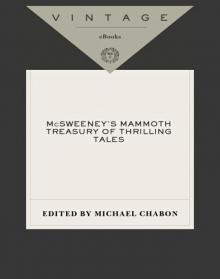 McSweeney's Mammoth Treasury of Thrilling Tales
McSweeney's Mammoth Treasury of Thrilling Tales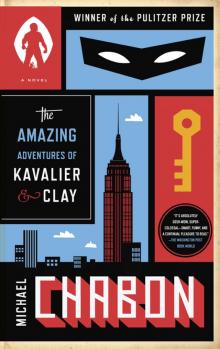 The Amazing Adventures of Kavalier & Clay
The Amazing Adventures of Kavalier & Clay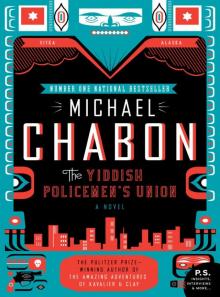 The Yiddish Policemen's Union
The Yiddish Policemen's Union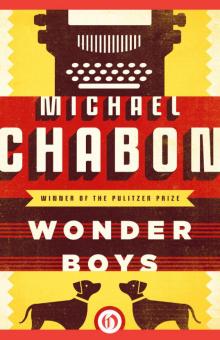 Wonder Boys
Wonder Boys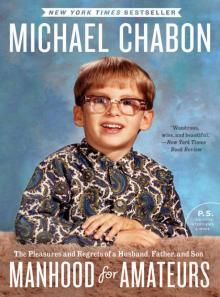 Manhood for Amateurs
Manhood for Amateurs Kingdom of Olives and Ash: Writers Confront the Occupation
Kingdom of Olives and Ash: Writers Confront the Occupation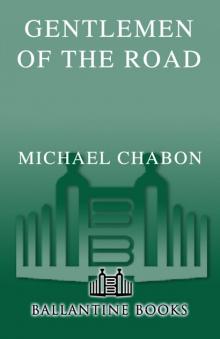 Gentlemen of the Road: A Tale of Adventure
Gentlemen of the Road: A Tale of Adventure A Model World and Other Stories
A Model World and Other Stories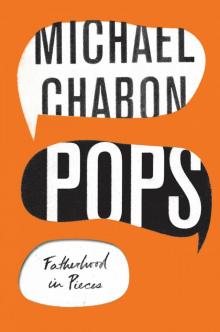 Pops: Fatherhood in Pieces
Pops: Fatherhood in Pieces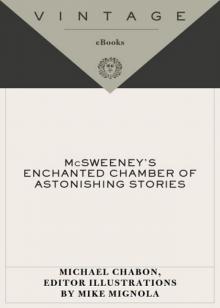 McSweeney's Enchanted Chamber of Astonishing Stories
McSweeney's Enchanted Chamber of Astonishing Stories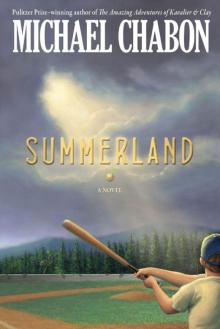 Summerland
Summerland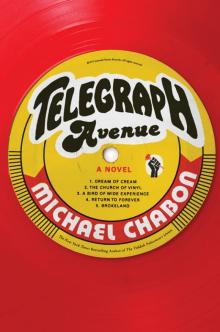 Telegraph Avenue
Telegraph Avenue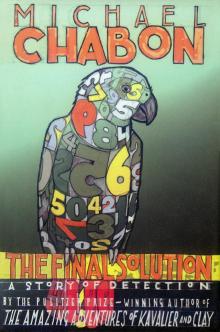 The Final Solution
The Final Solution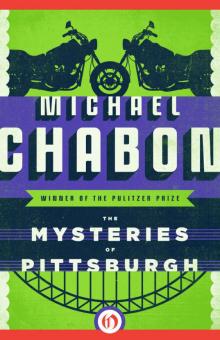 The Mysteries of Pittsburgh
The Mysteries of Pittsburgh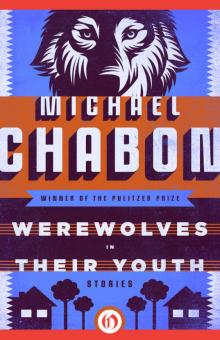 Werewolves in Their Youth
Werewolves in Their Youth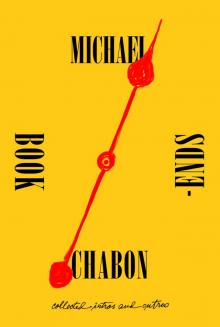 Bookends
Bookends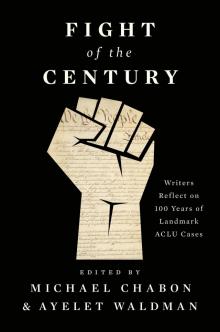 Fight of the Century
Fight of the Century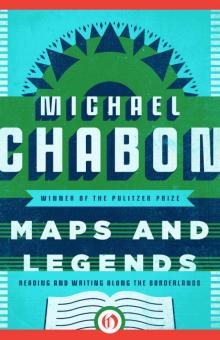 Maps and Legends
Maps and Legends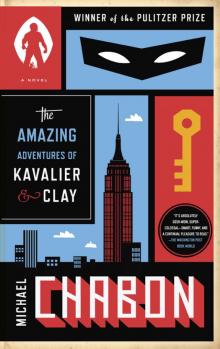 The Amazing Adventures of Kavalier & Clay (with bonus content)
The Amazing Adventures of Kavalier & Clay (with bonus content) Kingdom of Olives and Ash
Kingdom of Olives and Ash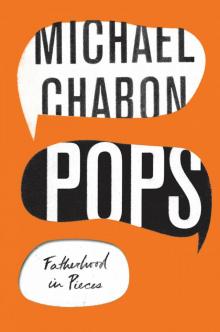 Pops
Pops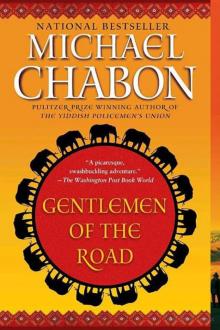 Gentlemen of the Road
Gentlemen of the Road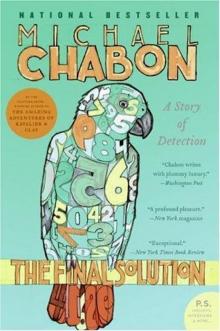 The Final Solution: A Story of Detection
The Final Solution: A Story of Detection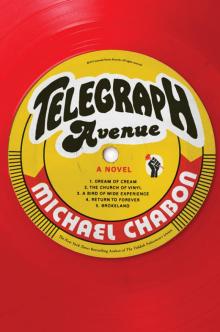 Telegraph Avenue: A Novel
Telegraph Avenue: A Novel